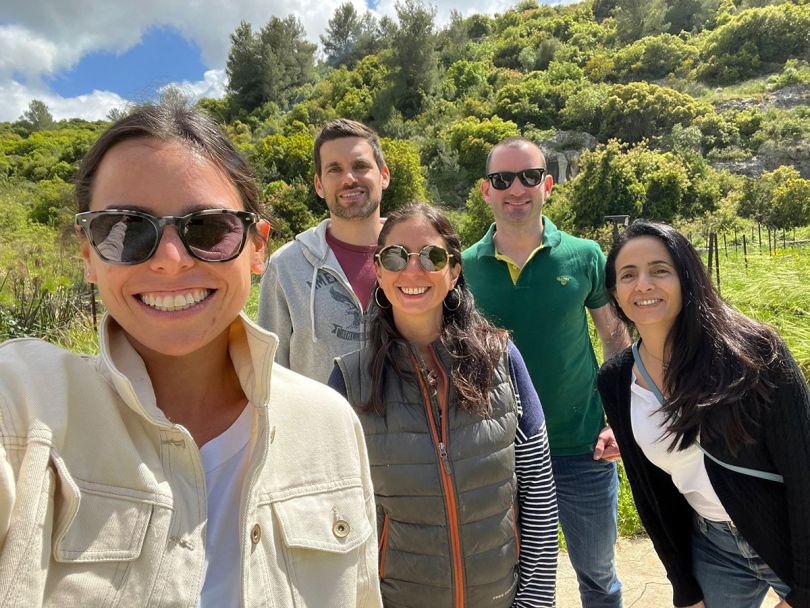There’s a smart way to get your manager on board with your career goals. But first, you need to accomplish a much bigger and somewhat trickier task: Figure out what those goals are.
“It’s hard to define your goals if you aren’t aware of your strengths, your potential areas of improvement, and what type of work motivates you,” Jelani Thomas, Orchard’s associate product manager, said.
He’s not alone in that sentiment.
Oftentimes, managers aren’t the ones who are stepping in the way of an individual contributor’s career development. It’s the lack of defining clear goals on the part of the individual contributor that creates a murky path for growth.
Does this sound like you? Well, you’re not alone.
“It’s OK to not know your long-term career goals,” Brian Cai, a senior operations manager at FINN, said. “Instead, focus on breaking down your goals into small steps toward advancing yourself as a professional. These small steps will add up and position yourself for further opportunities.”
Following this approach will also inevitably lead to incremental daily improvement, added CB Insights’ Director of Strategic Accounts Daniel Zaccaria.
“Suddenly, it becomes less about the big picture and more about focusing on what I can do to enhance and develop my skills each week, month and quarter,” Zaccaria said.
Once you cover those steps, that’s when you can get your manager on board with your career goals. How do you do that? Built In sat down with four professionals to learn how their managers have helped them achieve their goals.

What are your long-term career goals, and how does your current role fit into that path?
One of my goals is to start my own company. Working at Orchard is helping me gain important skills for pursuing this goal. At Orchard, we pay close attention to the market, the real estate industry and our customers in order to effectively prioritize work. This is the same knowledge a founder needs to leverage and build an effective business.
I’ve also had the opportunity to own projects on the product side. That has been one of the most exciting perks of working with Orchard. They hire people they trust to complete work at a high level, and those expectations are what propel me to lead and take ownership of my domain. My role is very cross-functional, so I get the opportunity to learn from intelligent domain experts. Working with smart people elevates your own work.
What role has your manager played in helping you achieve your professional goals?
My manager and I speak a lot about the mentality of a product manager and how that informs my output. We take the time to chat through not just the work, but different ways of strategically approaching it. I look forward to one-on-one chats with my manager because he has a wealth of knowledge on what it takes to be a great teammate, how to manage stakeholders, and how to accelerate the speed of quality decision-making. It’s only been three months since we’ve started working together, and his mentorship has already made me a stronger professional.
It’s hard to define your goals if you aren’t aware of your strengths, your potential areas of improvement, and what type of work motivates you.’’
What tips would you offer to a professional who is looking to communicate their career goals to their current manager?
I think all professionals should practice self-awareness. It’s hard to define your goals if you aren’t aware of your strengths, your potential areas of improvement, and what type of work motivates you. Roles like product management can be taxing if you don’t genuinely enjoy the work. So knowing the type of career that you want will save you a lot of time and energy along the way.
When creating your career goals, try to be as specific as possible. It’s good to know that you want to work in tech. It’s better to know you want to be a product manager. Also, having a strong “why” can really be helpful for yourself and your manager. If you can articulate your purpose behind certain goals, it reinforces to your manager that this is something you thought deeply about and is ultimately a driver for you.
Orchard is a real estate tech company that aims to make it easier and more straightforward to buy and sell a home.
What are your long-term career goals, and how does your current role fit into that path?
I want to work my way into a chief revenue officer position. My current role and time at CB Insights (CBI) has shown me the ins and outs of the post-sales realm. On the CBI strategic accounts team, we work closely with our peers on the new business side of the house. I’m lucky to gain exposure and learn more about the complexities of the new business motion.
In my opinion, learning by doing is the best way to develop.”
What role has your manager played in helping you achieve your professional goals?
Our career conversations are huge. It’s less about the big picture and more about focusing on what I can do to enhance and develop my skills each week, month and quarter. My manager does a great job holding me accountable, which trickles down to the rest of my team. My manager has helped me achieve my professional goals by giving me the opportunity to manage and execute on organizational strategic initiatives. In my opinion, learning by doing is the best way to develop. I’m lucky to have a manager who gives me that opportunity.
What tips would you offer to a professional who is looking to communicate their career goals to their current manager?
Seek out a mentor/mentors and develop a plan. When you gain the perspective of experienced individuals, you’ll have a better grasp on how to put your best foot forward each month, quarter and year. Also, raise your hand and take a chance on a project that is outside of your comfort zone. You are not going to get anywhere by keeping both feet planted on the ground at all times. The best way to grow is to stretch yourself. It’s also a guaranteed way to expand your network and work with new and smart individuals.
CB Insights’ market intelligence platform analyzes data points on venture capital, startups, patents, partnerships and tech news.

What are your long-term career goals, and how does your current role fit into that path?
My long-term career focus has been the managerial path. In my current role, I lead a team of program delivery and operations managers within Kaltura’s product division. I love being part of the division that sets the long-term strategy, and also executes the delivery of new products. In addition, my team interacts with all other divisions of the company. That gives me the opportunity to learn what other parts of the company do, and allows me to interact with other key stakeholders. Being a recognizable face and a meaningful contributor across the company is a huge advantage when aiming for an executive role. I want to keep growing in this area and aim for COO/VP of operations roles.
It’s crucial to coordinate with your manager to build a path for you to shine.’’
What role has your manager played in helping you achieve your professional goals?
We meet and discuss my personal development. Some of these conversations assess the right direction I should take, and the right pace. It’s crucial to coordinate with your manager to build a path for you to shine. When I was offered my current job, I originally hesitated, because it didn’t include direct management. After sharing my career aspirations and discussing my concerns with the position’s manager, I realized that there’s room to grow in that role both professionally and managerially in the long run. I learned from that experience that trusting your manager is a key factor. Personal development and feeling appreciated by your managers are critical factors to employee satisfaction. As a manager, I do the same with my team.
What tips would you offer to a professional who is looking to communicate their career goals to their current manager?
If you already have a clear vision of where you want to take your career, that’s great. Share it with managers who know you and are familiar with the relevant industry and get their feedback.
Also, try to figure out what you’re good at and what you enjoy doing. Be professional, keep learning and expand your abilities. Make sure you stay relevant and that your contribution to the company is visible. Take ownership and be proactive, but stay humble. Map the technical, professional and managerial skills that are needed for your next targets and build a plan for how to gain them. Take a course or shadow a manager. And most importantly, be sure to gather and be receptive to feedback!
Kaltura powers video experiences for global enterprises, media companies, educational institutions and more.
What are your long-term career goals, and how does your current role fit into that path?
My long-term goal is to be in a position where I can bring opportunities to those who otherwise would not be able to share their visions with the world. Be it through capital, connections or guidance, I want to discover and develop founders and companies that can disrupt industries.
FINN is an incredible vehicle for my growth toward such a dream. I am surrounded by diverse and talented colleagues from across the world, and I learn so much from them. As we build FINN with sustainable growth and scalability in mind, I am executing go-to-market strategies with our operations team. That execution teaches me how to effectively build, launch and scale a company from the ground up. FINN has also shown me the importance of company culture. Creating an environment that fosters collaboration and openness allows people to share different perspectives, which is paramount to the success of a company. The insight I have gained through this experience will be invaluable when I look to guide companies through their growth.
I would describe my manager’s leadership style as ‘compassionate coaching.’”
What role has your manager played in helping you achieve your professional goals?
At FINN, we place a lot of value on real-time feedback. Open and honest conversations have cultivated an environment of constant personal and professional development. I’ve relayed my professional aspirations to my manager, which grants me the opportunity to truly own my areas of interest and challenge myself to take on greater responsibilities. I would describe my manager’s leadership style as “compassionate coaching.” By understanding what I value and trusting me to own my workstreams, I feel encouraged to pursue ideas and execute on strategies.
What tips would you offer to a professional who is looking to communicate their career goals to their current manager?
It’s okay to not know your long-term career goals. Focus on breaking down your goals into small steps toward advancing yourself as a professional. The small steps will add up and position yourself for further opportunities.
It is very important to listen and learn about the paths of those around you. Learning about the journey of others may uncover passions and career routes. It may also show you routes you don’t want to take.
Lastly, open communication with your manager is imperative to your career progression. By sharing your goals and interests with your manager, you can remove the guesswork. They can unlock your route and help you accomplish those goals. Don’t be scared to ask for your manager’s opinion! Oftentimes, they may have been in a similar position at one point in their career.
FINN’s mission is to make mobility fun and sustainable by offering all-inclusive, monthly car-subscriptions.












